Search engine optimization (SEO, as we call it) is the cornerstone of building a successful online presence.
Whether you run a blog, an online shopping store, or a corporate website, SEO plays a big role in bringing organic traffic to your digital doorstep.
Did you know that only 0.63% of internet users click on a result from the second page? The remaining users do not even go beyond the first page.
So, how do these ranking pages get all the traffic?
They use the power of SEO.
But improving your SEO isn’t always easy. There are several scores you need to track and improve to make your website stand out.
In this guide, we’ll explain the key SEO scores, why they matter, and how you can find and improve them with the help of Keywords Everywhere.
What is an SEO score?
An SEO score is a measure that helps you understand how well your website or content is optimized to rank on SERPs (search engine results pages).
It acts as a guide to show you how easy or hard it will be to appear at the top of Google for specific keywords.
Different SEO tools may use SEO scores in their own way.
For instance, Keywords Everywhere’s SEO Difficulty Metrics help you figure out how tough it will be to rank for a particular keyword on Google.
Whenever you search for something on Google, you’ll notice a widget at the top-right corner showing you these four metrics.
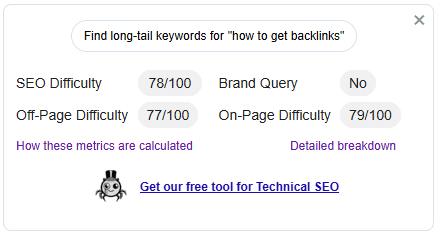
SEO Difficulty: This tells you how competitive a keyword is. The higher the score, the harder it is to rank for that keyword.
Brand Query: This tells you if the keyword is brand-specific. If it is, ranking #1 can be tough unless you’re the brand itself.
Off-Page Difficulty: This measures the strength of backlinks the top 10 ranking pages have. A higher score means you’ll need strong backlinks and good domain authority to compete.
On-Page Difficulty: This shows how well the top-ranking pages are optimized. If most of them have highly optimized content, it will be harder to outrank them without top-notch on-page SEO.
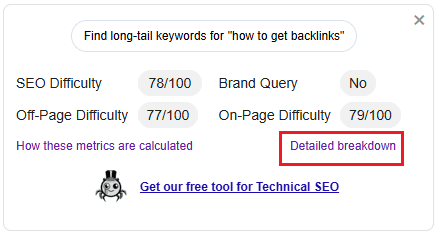
When you click the Detailed Breakdown link, you’ll see exactly how each metric is calculated. You can copy or export this data for later use.

Here’s what makes Keywords Everywhere stand out: unlike other tools, we don’t keep our formulas a secret.
We’re transparent about how we calculate everything, so you can trust that our metrics are based on clear, reliable data.
Why are SEO scores important?
Now that we know what SEO scores are, it’s time to address why they’re important.
SEO scores give you a clear picture of how well your website can perform in search results.
They show you where you’re doing well and where you need to improve to climb up the rankings.
This is very important because the higher you rank, the more users will visit your site. And more visitors often lead to more conversions and business growth.
In fact, a click-through rate (CTR) of over 3% is considered good for SEO. The #1 result on Google’s search page gets an average CTR of 27.6%, which means it’s 10 times more likely to get clicked than the page ranked at #10.
It’s clear from the numbers—pages that rank higher are the ones that dominate the digital space.
That’s exactly why SEO scores are so important. Here’s how they can help you:
They save you time and effort.
Instead of guessing which keywords to target or what areas to focus on, SEO scores give you very specific insights. For example, knowing the SEO Difficulty Score can help you decide if your keyword is worth pursuing or if it’s too competitive.
They guide your strategy.
With scores like Off-Page Difficulty and On-Page Difficulty, you can figure out exactly what’s holding your site back.
Is it a lack of backlinks? Do you have too many broken links? Does your content need better optimization? SEO scores point you in the right direction.
They help you prioritize.
Not all tasks are equally important. If a keyword has a high Off-Page Difficulty, you know you’ll need to focus more on building backlinks.
On the flip side, if it has a high On-Page Difficulty, your content optimization becomes a priority.
They make you competitive.
SEO is about staying ahead of your competitors. By understanding your SEO scores, you can see where you stand compared to the top-ranking pages and take steps to close the gap.
They give measurable progress.
SEO is a long-term game, and it’s easy to feel stuck if you can’t see results. SEO scores act as benchmarks as they show you how your efforts are paying off and where there’s still room to grow.
In short, SEO scores are like a health check for your website.
Tools like Keywords Everywhere make it even easier by providing clear, actionable scores so you can focus on what matters—getting your website noticed and driving traffic.
What are the key SEO scores and how can you find them?
Keywords Everywhere provides four types of SEO scores. Each of these will help you determine how easy or hard it is to rank for any keyword on Google.
Let’s break down each score and see how you can use Keywords Everywhere to find them.
1. Off-Page Difficulty SEO Score
Off-page SEO focuses on activities outside your website that help improve your rankings in search results.
It includes strategies like link building, local citations, and more, all aimed at making your site appear more trustworthy and authoritative to both search engines and users.
Why does this matter? Because if search engines don’t see your site as credible, it can hurt your rankings and overall online visibility.
Simply put, off-page SEO is just as crucial as on-page SEO for your success.
With Keywords Everywhere, you can easily check the Off-page SEO difficulty score for any keyword on Google.
This score measures the backlink strength of the top 10 pages ranking for any search query. A high score means you’ll need strong backlinks from reputable websites to compete effectively.
Finding the Off-page SEO difficulty score is super simple. Just install the Keywords Everywhere browser extension, switch it on, and search for any keyword on Google.
For instance, if you search “backlink audit,” you’ll see a widget in the top-right corner showing the Off-page SEO difficulty score, just like in the screenshot below.
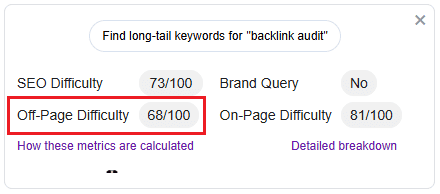
You can also check the backlink strength of each of the top 10 ranking pages. Simply click on the “Detailed Breakdown” option, and you’ll see a table like this:
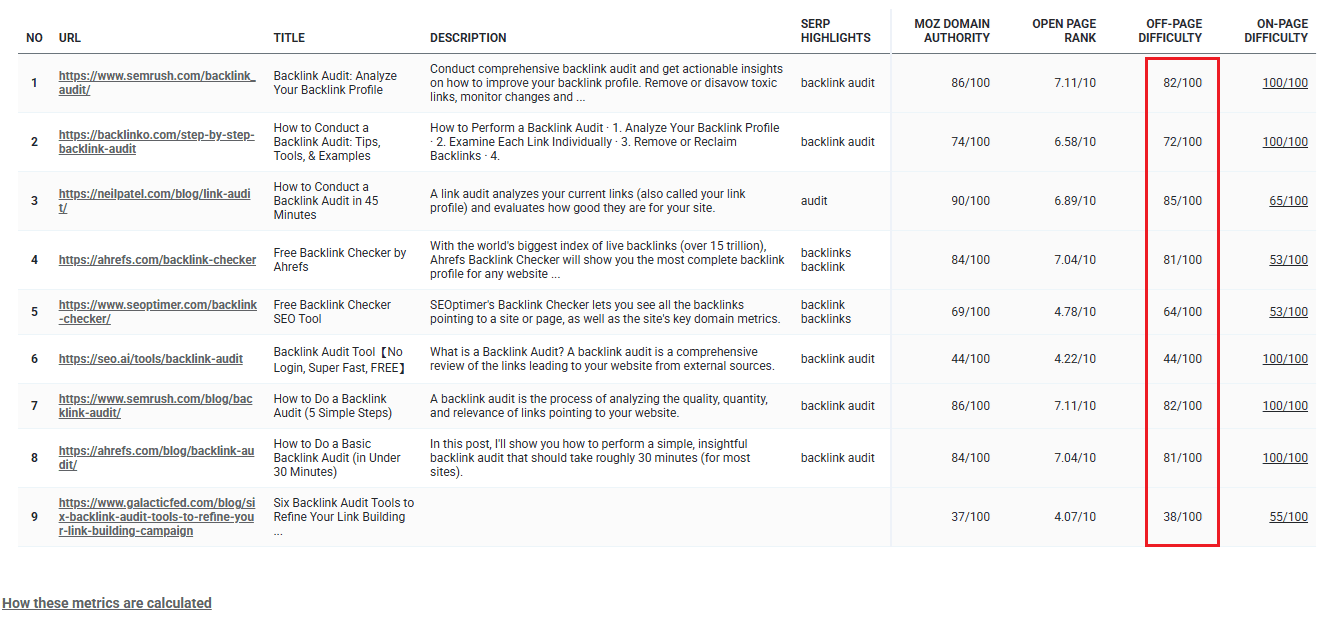
From this table, you can tell that most ranking pages (except the 6th and 9th) have a strong backlink strategy, which explains their high Off-page SEO difficulty score.
If you want to rank for the same keyword, you’ll need to build quality backlinks from high-authority sites.
On average, the top result in Google has nearly four times as many backlinks as lower-ranking pages. Research also shows that pages with more backlinks consistently perform better in search rankings.
Of course, earning backlinks from authoritative sites isn’t always easy.
However, creating and publishing valuable, high-quality content regularly increases your chances.
When your content provides value, publishers and brands are more likely to mention and link to it organically.
You can also take a proactive approach by reaching out to third-party sites and requesting link attributions or mentions.
2. On-Page Difficulty SEO Score
On-page SEO is all about improving your website’s content to make it easier for search engines to understand and more appealing to users.
This includes optimizing elements like titles, content, URLs, internal links, and other factors that can influence your ranking on search engines.
It’s different from off-page SEO, which focuses on activities outside your website—like building backlinks, social media promotion, and PR efforts.
While both are important for a strong SEO strategy, the advantage of on-page SEO is that it’s entirely in your hands.
Keywords Everywhere lets you easily find the On-page SEO Difficulty Score for any keyword.
This score tells you how well-optimized the top-ranking pages are for that keyword. A higher score means those pages are already using effective SEO strategies, so you’ll need to work harder to compete.
What makes Keywords Everywhere stand out is its full transparency. Unlike other tools that use hidden formulas, you can see exactly how these scores are calculated here, so you’re never left guessing.
Finding the on-page SEO score is super simple. Go to Google and search for any keyword.
For example, if you search “best SEO tools,” you’ll see a widget in the top-right corner of your screen showing the on-page difficulty score.
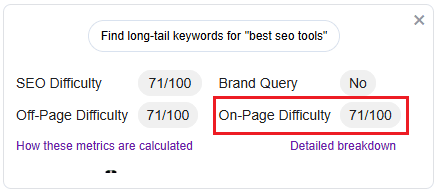
In this example, the on-page difficulty score for “best SEO tools” is 71/100.
This means the top-ranking pages have highly optimized content, with elements like SEO-friendly titles, URLs, descriptions, and SERP highlights.
You can also find the on-page difficulty score for each ranking page. Simply click the “Detailed breakdown” option, and you’ll see a table like this:
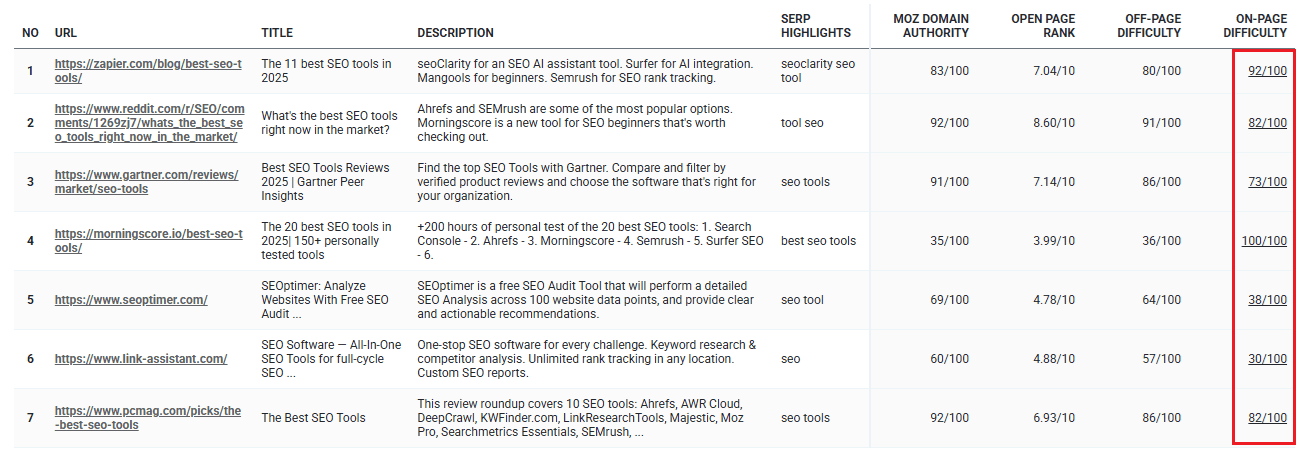
You’ll notice that almost every ranking page, except for the 5th and 6th, has a high on-page SEO score. These high scores indicate strong optimization.
If you want more details, click on the “On-Page Difficulty value” for each page. A popup will show you how the page scored on seven specific factors:
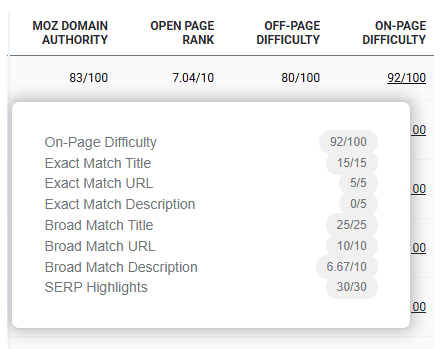
- The exact search query in the page title
2. The exact search query in the URL
3. The exact search query in the description
4. A broad search query in the page title
5. Broad search query in the URL
6. A broad search query in the description
7. Google-highlighted keywords in the description or special metadata
If a website meets all seven criteria, it gets a perfect score of 100/100, meaning it’s fully optimized for on-page SEO.
3. Brand Query
Brand queries are search terms that include a brand name. When users search for these terms, Google prioritizes showing the brand’s official website and social media pages at the top of the search results.
This makes it much harder for other websites to rank for such keywords.
How Keywords Everywhere Identifies Brand Queries:
Keywords Everywhere marks a search query as a brand query if:
- Google shows site links (additional links under the main result) for the first organic result.
2. The top three results are all from the same website.
3. Two or more results on the first page come from social media platforms like Twitter (X), Facebook, or Instagram.
Let’s see an example.
If you search for “Amazon offers” on Google, you’ll notice a widget from Keywords Everywhere in the top right corner of your screen. It will show whether the keyword is a brand query or not.
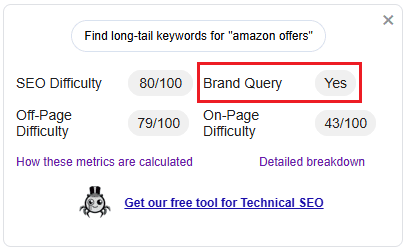
For “Amazon offers,” you’ll see a “Yes,” meaning it’s a brand query.
Why? Because the top three results are from Amazon itself, and Google also shows site links under the first result.
In this case, creating content targeting this keyword isn’t worth your time—it’s almost impossible to rank above the brand itself.
However, you can explore alternative keywords like “top 10 Amazon offers” or “best Amazon deals right now.”
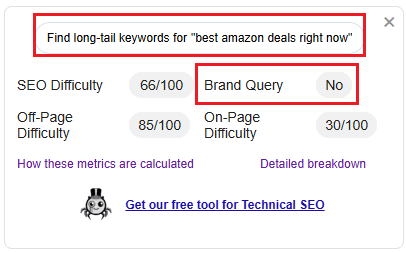
These have a better chance of ranking because they are more specific and not dominated by the brand’s official website.
However, not every keyword with a brand name is a brand query.
It’s important to note that just having a brand name in the keyword doesn’t make it a brand query. For instance, if you search “Is TikTok getting banned,” Keywords Everywhere will show “No” for the brand query.
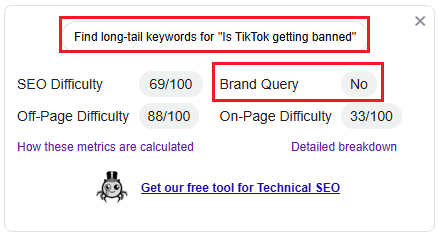
This means the keyword “Is TikTok getting banned?” isn’t classified as a brand query. You can confidently create content around this keyword because there’s a chance to rank for it.
Understanding brand queries can help you focus your efforts on keywords where you actually have a shot at ranking.
4. SEO Difficulty Score
SEO Difficulty is a combined score that takes into account three important factors: On-Page Difficulty, Off-Page Difficulty, and Brand Query difficulty.
It tells you how tough it is to rank for a specific keyword. The higher the score, the more difficult it will be to reach the top of search results.
There are a lot of things that contribute to keyword difficulty. These include the quality of the pages from competitors and the strength of your own page.
For example, if your competitors have strong backlinks and high authority, the keyword will have a higher difficulty score.
Focusing on keywords with lower SEO difficulty is a smart strategy. These are easier to rank for because you don’t need to have as many backlinks or domain authority.
You can easily find the SEO difficulty for any keyword using the Keywords Everywhere browser extension.
Simply search for your keyword in Google, and you’ll see a widget at the right corner of your screen showing the SEO difficulty score for that term.
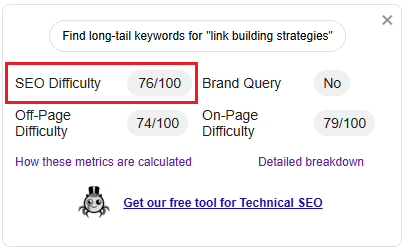
Many new bloggers make the mistake of picking a keyword, creating great content, and optimizing their page, only to realize they aren’t ranking at all.
Why?
The competition for that keyword might be too fierce.
This is why it’s crucial to consider keyword difficulty during your research process. By keeping track of keyword difficulty, you can:
- Understand which keywords are currently popular and dominated by major players in your niche.
2. Find alternative keywords that still have a good search volume but less competition, giving you a better chance of ranking.
3. Save time and effort by focusing on keywords that are achievable, even if your site doesn’t have much authority yet.
In short, SEO difficulty helps you set realistic goals for your content and SEO efforts to maximize your chances of success without wasting resources on too competitive keywords.
What is a good SEO difficulty score?
In our experience, keywords with SEO difficulty scores over 65 are usually more competitive, meaning it will take more time, effort, content, and backlinks to rank for them.
On the flip side, keywords with SEO difficulty scores below 65 are easier to target, making them a great choice for new businesses or startups that are just diving into SEO.
Conclusion
Understanding and tracking your SEO scores is essential for improving your website’s visibility on search engines.
When you focus on key scores like SEO Difficulty, On-Page Difficulty, Off-Page Difficulty, and Brand Query, you can identify the challenges and opportunities for ranking higher.
Tools like Keywords Everywhere make it easier to assess these scores and provide valuable insights into how competitive a keyword is and what areas need improvement.
You can optimize your current content or create a strategy for new content based on these scores.


